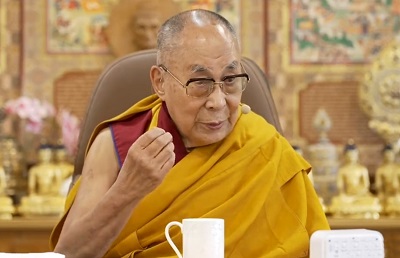Dharamsala, (Samajweekly) Tibetan spiritual leader the Dalai Lama on Saturday greeted Tibetans in Tibet and in exile on Tibetan New Year, Losar 2151 — the year of the Wood-Dragon.
In a video message, the spiritual leader said: “Despite undergoing great difficulties in exile and living under a powerful Communist Chinese regime, our people, the majority of whom are inside of Tibet, have remained unscathed while I have been the leader.
“Although the Communist Chinese rulers, after the ‘so-called peaceful liberation’, have wished that we Tibetans forget our religious faith, we have held onto our convictions and our culture even more firmly — this is very good. Today, there is a renewed interest in Buddhism, not only among Tibetans, but even among some Chinese.
“In many parts of the world today, Tibetan spiritual and cultural traditions are regarded as logical, rational and of practical benefit when closely considered since they enable us to transform our minds in a positive way and bring about inner peace.”
According to the Tibetan lunar calendar, Losar is the first day of the New Year. Traditionally, it is celebrated in a big way. This year, the festival falls on February 10. The three-day festival marks sacred and secular practices like prayers, ceremonies, rituals, and folk dancing and merrymaking.
The elderly Buddhist monk said: “Nowadays, an increasing number of people in Western countries are taking interest in Tibetan culture and spirituality. I’m also aware of an increasing number of Western scientists who admire the methods for developing a kind heart that is found in our culture, although they lack any religious belief.”
Saying that the Communist Chinese have attempted systematically to eliminate spiritual and cultural heritage, His Holiness in the video message added: “However, it has become clear that rather than destroying it, there is a renewed interest in our cultural traditions in the world today.”
Wishing, in particular, to express appreciation for his fellow Tibetans in Tibet for the unflinching faith and devotion they possess, he said: “Still, I think it’s important that the new generation of Tibetans has a deep understanding of the good customs we have upheld for more than a thousand years, not just because they are our customs but also because they accord with reason.”
“In the reality of today’s world, I think it’s necessary that the new generation take a fresh look at the traditions we’ve preserved in the light of Western scientific interest. They need to understand why people in the West with no particular belief in religion take interest in our traditions.
“And they need to be able to recognise the value of the centuries-old cherished treasures of Tibet in order to preserve them well.”









